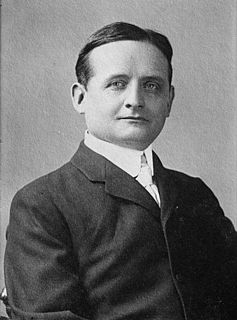In many countries, a mayor is the highest-ranking official in a municipal government such as that of a city or a town.

Adolf Deucher was a Swiss politician.

Ernst Nobs was a Swiss politician.

Joseph-Alfred Mousseau,, was a French Canadian politician, who served in the federal Cabinet and also as Premier of Quebec.

Elections to the United States House of Representatives were held in 1886 for Representatives to the 50th Congress, taking place in the middle of President Grover Cleveland's first term.
Cambridge University Liberal Association is the student branch of the Liberal Democrats for students at Cambridge University.
The Los Angeles Common Council was the predecessor of the Los Angeles, California, City Council. It was formed in 1850 under state law, when the city had only 1,610 residents, and it existed until 1889, when the city had about 50,400 residents and a city charter was put into effect.

Jhr. Joan Röell was a Dutch nobleman, lawyer and statesman. He was a member of a prominent Dutch noble family which produced many public administrators, and politicians.

Sir Edward Horne Wittenoom KCMG was an Australian politician who served intermittently in the Legislative Council of Western Australia between 1883 and 1934, including as President of the Legislative Council from 1922 to 1926. He sat in the Legislative Council from 1883 to 1884, 1885 to 1886, 1894 to 1898, 1902 to 1906, and finally from 1910 to 1934. Wittenoom was a minister in the government of Sir John Forrest, and was also Agent-General for Western Australia between 1898 and 1901.
Benjamin Todd Frederick was an American miner, businessman, real estate agent and politician. After winning the Democratic nomination for the 1884 elections in Iowa's 5th congressional district, he was elected for one term (1885–1887) to the United States House of Representatives.
The 5th Legislative Assembly of Quebec was the provincial legislature in Quebec, Canada that existed from December 2, 1881, to October 14, 1886. The Quebec Conservative Party led Joseph-Adolphe Chapleau, Joseph-Alfred Mousseau and John Jones Ross was the governing party. Chapleau was succeeded by Mousseau in 1882 while Ross succeeded Mousseau in 1884. It was the Conservatives last majority government.
This is a list of members of the Tasmanian Legislative Council between 1885 and 1891. Terms of the Legislative Council did not coincide with Legislative Assembly elections, and members served six-year terms, with a number of members facing election each year.
The United States Senate elections of 1886 and 1887 were elections that had the Republican Party lose two seats in the United States Senate. At the beginning of the 50th Congress, therefore, Republicans had the slimmest possible majority due to a vacant Democratic seat: 38 out of 75 seats. Once that vacancy was filled, Republicans maintained control as the single Readjuster Senator caucused with them.

Federal elections were held in Switzerland on 27 October 1872. The Radical Left remained the largest group in the National Council.
Elections to Liverpool City Council were held on Saturday 1 November 1888. One third of the council seats were up for election, the term of office of each councillor being three years.
Elections to Liverpool City Council were held on Tuesday 1 November 1887. One third of the council seats were up for election, the term of office of each councillor being three years.
Elections to Liverpool City Council were held on Tuesday 1 November 1886. One third of the council seats were up for election, the term of office of each councillor being three years.
Elections to Liverpool City Council were held on Monday 2 November 1885. One third of the council seats were up for election, the term of office of each councillor being three years.

The Boston mayoral election of 1914 occurred on Tuesday, January 13, 1914. James Michael Curley, member of the United States House of Representatives, was elected Mayor of Boston for the first time, defeating Thomas J. Kenny, president of the Boston City Council.

The City of Chicago has held elections to its City Council since its incorporation in 1837. Elections were held annually from 1837 through 1921, biennially from 1923 through 1933, and quadrennially starting in 1935. From 1851 through 1922 the Council was staggered and half of it was chosen at each election, but before 1851 and since 1923 the entire Council has been elected at each election.











